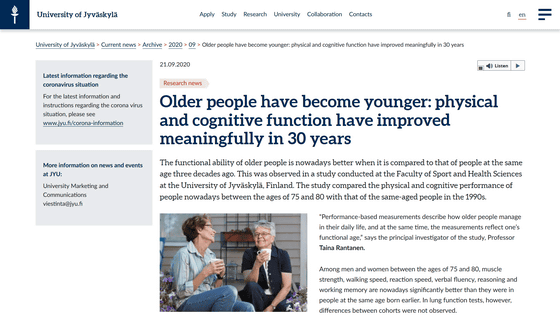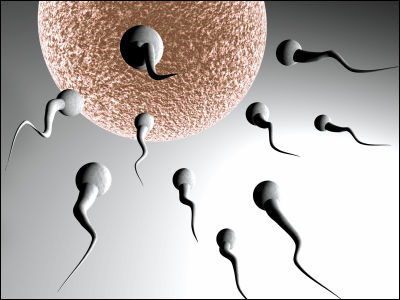It turns out that the elderly are more powerful both physically and mentally than 30 years ago

According to Cabinet Office
Cohort differences in maximal physical performance: a comparison of 75- and 80-year-old men and women born 28 years apart | The Journals of Gerontology: Series A | Oxford Academic
https://academic.oup.com/biomedgerontology/advance-article-abstract/doi/10.1093/gerona/glaa224/5901594
Birth cohort differences in cognitive performance in 75- and 80-year-olds: a comparison of two cohorts over 28 years | SpringerLink
https://link.springer.com/article/10.1007/s40520-020-01702-0
Older people have become younger: physical and cognitive function have improved meaningfully in 30 years — University of Jyväskylä
https://www.jyu.fi/en/current/archive/2020/09/older-people-have-become-younger-physical-and-cognitive-function-have-improved-meaningfully-in-30-years

This study was conducted at the Faculty of Sport and Health Sciences and Gerontology Research Center at Jyväskylä University. The first cohort was collected between 1989 and 1990 and consists of data on 500 elderly people aged 75 and 80 born between 1910 and 1914. And the second cohort collects data on the 75 and 80 year olds born between 1938 and 1939, or 1942 and 1943.
First, a comparison was made between the two cohorts in terms of walking speed, grip strength, knee flexion / extension, lung function, and vital capacity. As a result, in walking speed, the second cohort averaged 0.2 m to 0.4 m / s faster than the first cohort, grip strength was 5% to 25%, knee flexion and extension was 20% to 47%, and vital capacity was 14 to 21. It turned out to be improved by%.
Furthermore, when the results of tests to measure cognitive abilities such as phonological fluency, working memory, and reflexes were compared between the two cohorts, significant improvement was confirmed in all cohorts.

Kaisa Koifnen, one of the research teams, said, 'The improvement in walking speed and grip strength in the second cohort is thought to be due to increased physical activity and increased body size. The most important and fundamental factor in the cohort in cognitive ability was prolonged education. '
'The older people in the second cohort are growing up in a different world than the people in the first cohort, who were born 30 years ago,' said Matty Munucca, also a member of the research team. For example, nutrition. And hygiene have improved, and advances in health care and school systems have improved access to education and a better working environment. '
Professor Taina Lantanen of Jyväskylä University said, 'The results of this study show that our understanding of the elderly is old. Also, in an aging society,' increased healthy lifespan 'and' need for long-term care. ' There are two problems that can be seen: 'The number of super-elderly people is increasing.'
Related Posts:
in Science, Posted by log1i_yk







